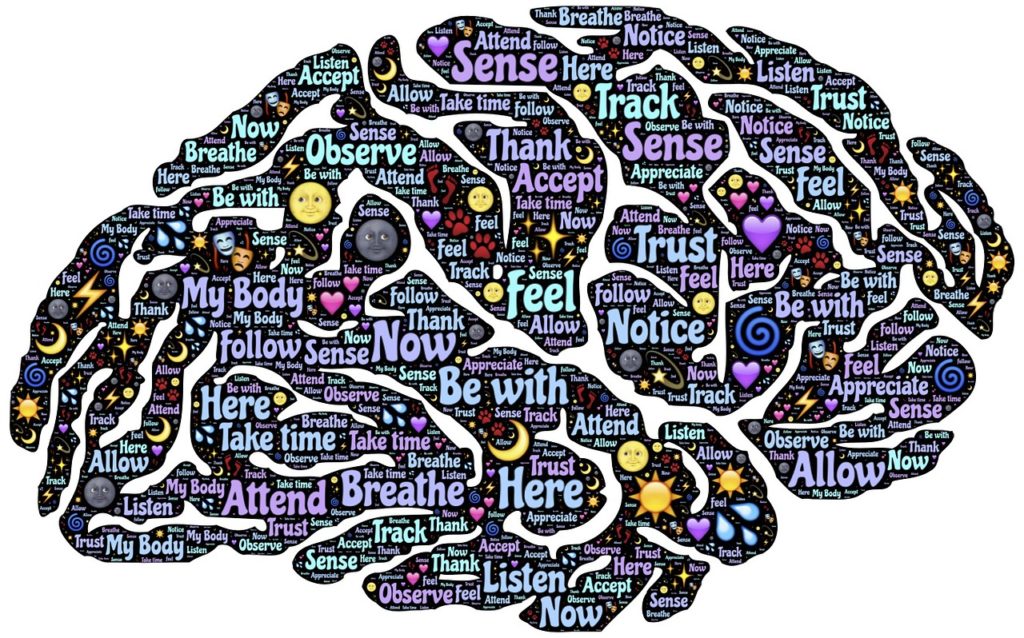Psychological skills are “mental tools” we learn to think about, process, understand, and manage all that we experience. You’ve learned and are familiar with many, like communication skills, social skills, and coping skills. In the ERM*, it is the Rider’s role and responsibility to learn and develop intrapersonal skills that help us more effectively 1) question and comprehend our beliefs, 2) resolve or reconcile conflict (past and present), and 3) attend to the emotional and intellectual needs of healthy well-being.
Some of these intrapersonal skills include:
- Self-Awareness– Being attentive to and curious about “what is going on” inside oneself. It involves engaging the Observing Self, developing mindfulness practices, and promoting self-knowledge.
- Self-Regulation – Is managing constant change and the attendant difficulties/problems/challenges that happen in your life. It’s being able to calm yourself down when you’re upset and cheer yourself up when you’re down; and to act (i.e., behave) in ways that serve both short-term needs and long-term best interest.
- Processing – Being able to reflect on, consider, and understand the why and the how of certain reactions, feelings, and moods you have…and to then positively alter or effect future outcomes and consequences. (In the ERM, this is the Rider training, or retraining, the Elephant.)
- Psychological Flexibility – Being open-minded and able to rise above the Elephant-driven “in-the-moment” automatic reaction one is experiencing. It is an antidote to bias.
- Retraining the Elephant – This mental process builds on a combination of other skills, the goal being to identify and change mistaken or dysfunctional beliefs held in the Elephant. In one’s effort to problem-solve and make life better, it is that endeavor “to get the reality right.”
- CBT (Cognitive Behavioral Therapy) – While known formally as “a therapy,” it’s also a skillset anyone can learn. CBT is a cognitive strategy that helps to identify and expose one’s biases and distorted thinking (its source most likely that dysfunctional conditioning we have all been subjected to), and to see one’s interpretations of the world – as well as of others – more clearly. It’s also very effective in problem-solving and in helping to re-train the Elephant.
- Step Back – Is being able to engage “a learned reaction” that gives our Rider a chance to “be heard,” thus helping to protect oneself in a potential or escalating crisis.
- Defusion – Is being able to look at your thoughts and feelings without being caught up in, always believing, or being ruled by them. It’s very helpful in problem-solving, and a key skill in processing dysfunctional anxiety, depression, anger, and conflict.
- Acceptance – Is being able to let your thoughts and feelings be – however disturbing or unpleasant – while you direct your efforts and energy to doing what is truly important.
- Sitting Quietly (SQ) – This is perhaps the easiest and yet one of the most effective and beneficial skills one can develop. This may even be surprising, as it’s unlikely one was taught this skill growing up (although for many this is an irony in that they were often told to “be quiet” or to “shut up” when a child). SQ is a skill that is practiced in a variety of ways, and many are presented and used in the ERM. SQ can 1) facilitate self-knowledge, mindfulness, tolerance, and humility; 2) reduce stress and obsessive preoccupation with one’s feelings; and 3) enable personal insight and discovery.
- Critical Thinking – Is being able to spot fallacies, manipulations, and obstacles in verbal, written, and intrapersonal communication; and thus better able to make personal choices about what to accept and what to reject. And it’s very helpful in identifying and overcoming all that dysfunctional conditioning one has been subjected to, and the unwitting victim of…
_________________________________
*Elephant/Rider Model: Based on the metaphor from The Happiness Hypothesis, Jonathan Haidt, 2006.

